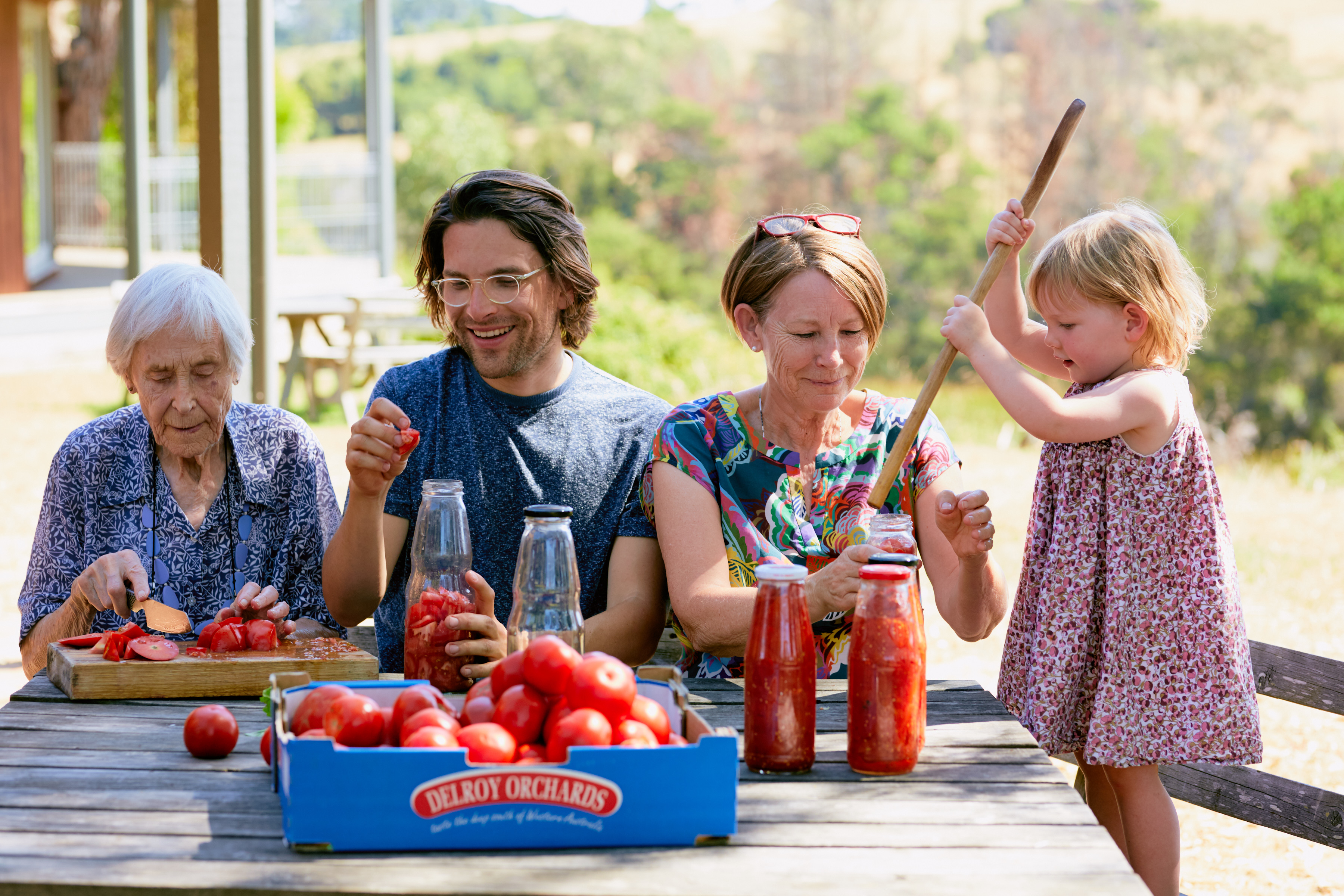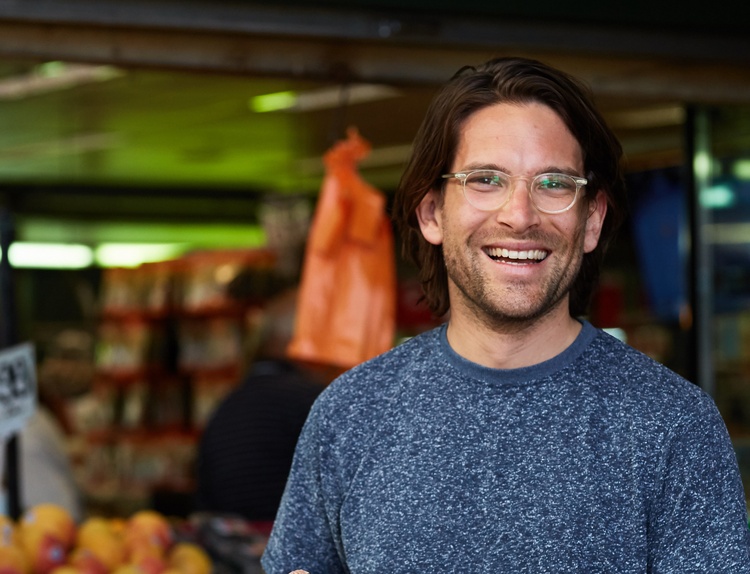The Melbourne-born doctor has seen more of the world than most will in a lifetime.
Sandro Demaio imagines a healthier world without social inequality.
It is a manifesto that the doctor and globally-renowned public health expert is committed to wholeheartedly.
It is his drive to move forward, by investing strategically and encouraging his generation and the next to change the world for the better.
The CEO of the Victorian Health Promotion Foundation (VicHealth) – world’s first health promotion agency – welcomes me with a smile in the offices in East Melbourne.
He walks me through rooms designed for sensory comfort and inclusivity, enriched with green plants and colourful murals made by eight different artists from Multicultural Arts Victoria.
The main concept is to encourage mental well-being and harnesses creativity.
At the centre is the room “where most of the magic happens”.
“The kitchen - same as in an Italian house, of course”, he says.
“We wanted to have a big table where we could meet, share food and talk. And it works just as well here as it does at home.”
Demaio immediately casts his memory back to his formative years in Melbourne. He reminisces about sunny afternoons in Cobram surrounded by his cousins, seated at long tables where his passion for good Mediterranean cuisine sprouted.
“Food is the essence of culture, and culture is the very essence of life”, he says.
“I love the Italian culture for what it represents – it’s about food, it’s about family. There’s a sense of community and connectedness. It’s a part of who I am, it’s the way I grew up.”
His nonno Giuseppe - originally from Varapodio, a small town in Calabria - arrived in Victoria in 1937. The plan was to work in Australia “for a few years” before returning to his wife and four children, as was customary for many Italian families during the era.
However, World War II broke out and changed everything.
The years were full of letters punctuated with tears that travelled thousands of kilometres and across immense oceans. Jobs in mining and construction projects prompted his nonno to live “almost interned” whilst the war was devastating the Bel Paese.
Only in 1948 was the family finally reunited. A year later, the youngest son Pietro was born – the only one to be born in Australia.
“My grandparents were very entrepreneurial as first-generation migrants tend to be”, Demaio recounts.
“In Australia, my nonno was involved in some of the biggest public projects, and then he got into agriculture as a farmhand.
“Eventually, he saved up enough money to start his own business. My cousins were all growing fruit in Cobram and Shepparton, and my nonno was selling it in the city.
“My father Pietro is very entrepreneurial too. He’s very hard working and very passionate about the community.”
From an early age, Demaio was inspired by his family’s sense of duty, an incredible legacy that he has never let go.
His father has built Australia’s largest independent medical centre in Burwood, strongly focusing on free health care and bulk-billing.
His mother, a “very intelligent, hard working and supportive woman with an Australian background”, taught him to take care of others and his own family.
“[We were raised with a] community focus, interest in health [and the] work ethic of a typical migrant family,” he explains.
“My brothers and I always grew up being cognisant of the opportunities that we had and the privilege that we have today.”

Sandro Demaio with his family making tomato sauce. From left to right: his grandmother Bette, his mother Lynn and his niece Mae
His father’s example was certainly instrumental in shaping his future.
During his childhood, his father wouldn’t bring home medical toys, but instead real medical gauzes and bandages to practice with, and a first aid kit that was added to over time.
His path to medicine was therefore inevitable. Demaio first commenced his studies at Monash University and volunteered in an ambulance service, before moving on to a professional traineeship at The Alfred Hospital.
He also experienced working abroad.
“My father and I went [with a non-government organisation] to provide aid in refugee camps in remote south-eastern Sri Lanka after the December 2004 tsunami,” Demaio says.
“I expected to see a lot of trauma, but in fact most of what we saw were the side effects from untreated hypertension, angina, diabetic ulcers — all because of disruption in access to medications and treatment.
“NCD treatments weren’t seen as part of essential medicines so they got none of the focus. In a sense they were seen as one step beyond humanitarian aid.
“There is a lack of understanding about NCDs, not only in Australia but in the region. And poverty tips people into NCDs and makes them worse, gives them a lasting impact.”
This humanitarian experience prompted Demaio to leave Australia and undertake a doctorate in medicine at the University of Copenhagen in Denmark where “health care is accessible and affordable”.
Following these studies, Demaio spent time in Mongolia where, as a Technical Advisor, he developed a national surveillance and registry system for non-communicable diseases.
This foray into social policy led Demaio to start to think that “he could actually do things differently”.
“Reducing tobacco, improving diets, increasing physical activity — they would have a huge impact,” he says.
“And how do you do that?
“We need to change the way we build our cities. We need to change the way we structure our economies. We need to shift our food systems so there are major changes to the way we live.
“Even in Italy, where I lived for six months in the late 1980s, providing lunch at school is a great example of a positive social policy.”
Following a Post-Doctoral Fellowship at Harvard Medical School, his roles as Medical Officer at the World Health Organization, Co-Founder at ‘NCDFREE’ – a global social movement against NCDs – and Advisory Board Member of the independent scientific platform EAT, Demaio decided to return to Melbourne to face the health challenges of our time.
“In a way I had to rediscover something that Italians have always known – food is very empowering and positive, and it’s a source of love, friendship and family,” he says.
“And if we want to change our society, it’s much easier to do that with a vision than with a stick or a punishment.
“My first childhood memory is in my nonni’s kitchen. And I’m glad that even my three-year-old niece loves cooking with my mother.
“I know that for some people cooking can be another source of stress because of the busy world we live in, but the secret is finding recipes that we don’t hate cooking – keeping it simple.
“Italian cooking, for example, is very simple. It’s just a few ingredients. The key is finding simple recipes that we enjoy eating and sharing even with our little ones.”
The surge to respond to the worrying trends in childhood obesity and the dramatic climate crisis prompted Demaio to imagine a different future for the tomorrow’s families, and more generally for the planet itself.
The key is still hidden in a healthy and positive approach to food.
The Doctor's Diet, published in 2018, is his guidebook, based on science and inspired by his Italian heritage and his love of good food.
The ‘Little Food Festival’, on the other hand, is his way to connect kids with food, combining education, exploration, creativity and fun in the heart of Federation Square.
Demaio considers himself “lucky” for the support that VicHealth received from the latest Victorian State Government Budget, yet he underlines “how far there is still to go”.
“We can do a lot more. We should do a lot more. But having said that, we’re a very well supported organisation. We’re protected to be able to do the work that we do,” he admits.
The current health climate is “disheartening”, after the COVID-19 pandemic and the most recent bulk-billing crisis. Demaio looks with sadness at the number of doctors, nurses and pharmacists who continue to quit their jobs.
But he is determined to stay focused on the positives, and probably, and a commitment to medical prevention could probably represent a solution to reduce the pressure on the health system.
Inspired by former Prime Minister of New Zealand, Helen Clark – “an amazing leader” – and his former boss at World Health Organization, Francesco Branca – “a diplomat and technical expert, but also a lovely person and a great cook” –, Demaio hopes to have kids in the future and give them some of the great opportunities that he was lucky enough to have.
He also plans to “continue to make a difference in the world”.
“I’m not retiring any time soon,” he says laughing.
“So hopefully I’m able to do keep doing that.”












